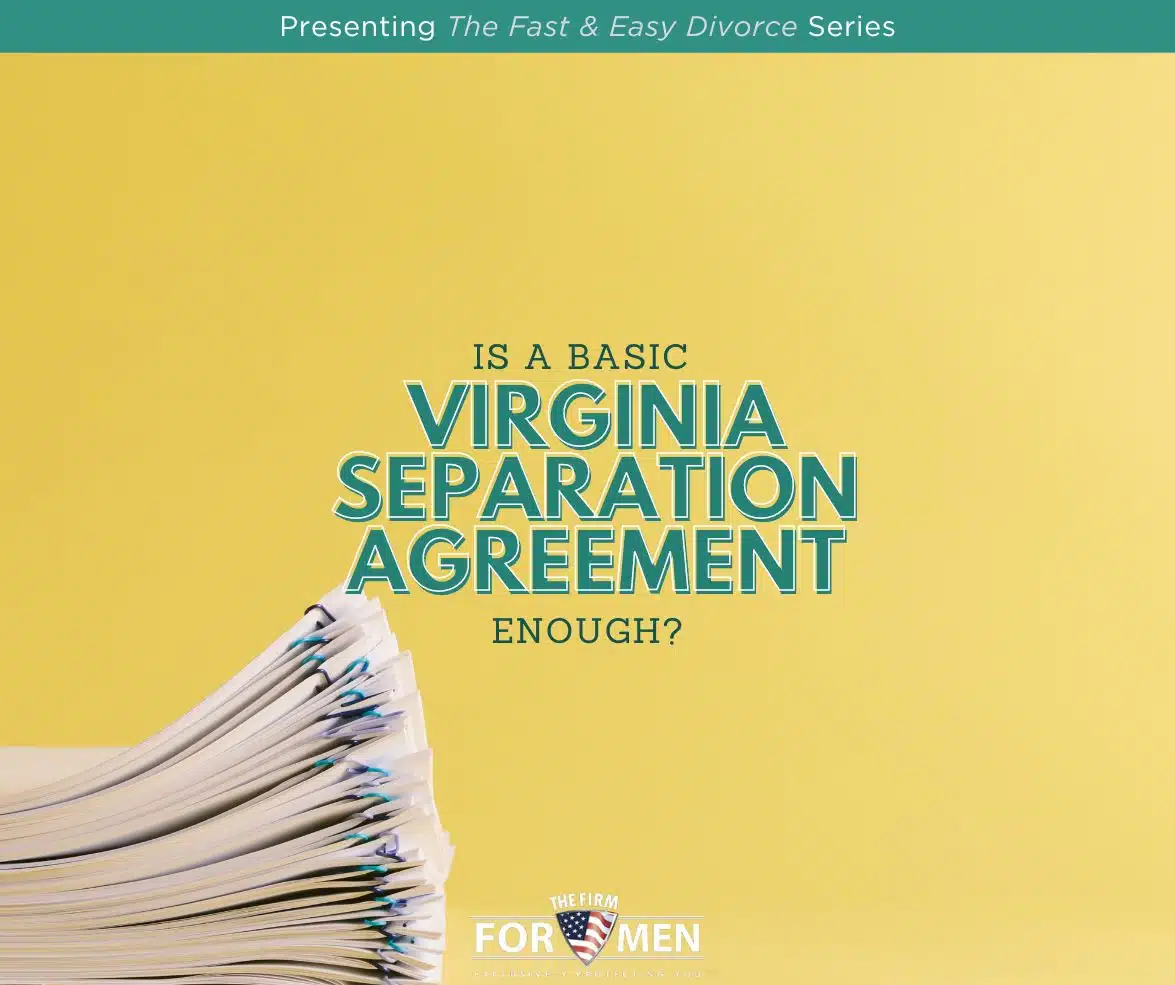Not much is left of Basic City, Virginia. It was whole and happy for only around 34 years before being consolidated with its neighbor in 1924. Basically, the town was a wild-and-wooly alternative to dry, conservative Waynesboro. At least while it lasted. Being basic wasn’t enough for Basic City, just as a basic separation agreement may not be enough for your Virginia divorce.
Just as Basic City was a bit of a misfire, a basic separation agreement could be a flash in the pan: all brightness and wonder in the moment, followed by a plunge into regret and darkness.
Why? First things first …
Jump to a Section
- What is a Property Settlement Agreement?
- Sins of Omission & Sins of Commission
- Your Two Virginia Attorneys
- Do You Need a Basic Separation Agreement?
What is a Property Settlement Agreement?
A property settlement agreement (a topic we have reviewed many, many times in these pages) is a road map, agenda, or guidebook to your divorce. The property settlement agreement comes somewhere between your date of separation and your divorce. It points the way to a successful and expedient divorce. It sets down an order and guides you to a tranquil final decree.
The document lays out the areas you and your spouse agree upon in untangling your two lives. Five specific areas must be addressed:
- Property division — who gets what, and how much of something you each get, from retirement accounts to someone’s collection of beer steins
- Child custody — determining both physical and legal custody, in all the many nuances, is tricky stuff
- Child support — You each pay to support you child or children; usually the noncustodial parent pays more
- Parenting time schedules — These are harder to work out than they may at first appear
- Spousal support — One of you may need a little extra greenery to get your life going on your own
While you and your departing spouse can often delay decisions on one, or maybe two of the five areas, the more you two agree on, the faster and smoother your legal process. Leaving something out entirely? That’s a basic mistake.
Sins of Omission & Sins of Commission
No, you don’t really know what complexificationisticism is, because we just invented the word. Still, you can get the gist. Things that can make a “basic separation agreement” complicated are sins of omission and sins of commission:
- Leaving out a vital area entirely, such as forgetting to hammer out mutually agreeable parenting time schedules (AKA visitation)
- Changes of residence (including one spouse moving out of state or out of the country)
- High-income opposing parties
- Vague or misleading wording that requires repeated revisiting in later years
- Irreconcilable differences of opinion on disposition of the five areas
- Military service
- High-value assets, such as artworks, patents, royalties, antiques, jewelry, and rare collectibles
Don’t misunderstand; basic is perfectly fine for some basic needs. If you can get by with a two-person camping tent, do you really need the $1.3 million RV? If your schedule is set in stone so that having the kids every summer for 2.5 months is absolutely fine, then maybe the basic property settlement agreement will work. But if one of you is staring at a career change, job transfer, or erratic schedule, a basic separation agreement will simply not do.
Your Two Virginia Attorneys
Your Virginia family law attorney and your spouse’s lawyer are legally required to advocate zealously for each client’s rights. Does that mean they are required to fight each other like some Virginia cage match? That does not mean the two attorneys cannot find common ground. In fact, the two attorneys are ideal problem solvers for going beyond the basics.
Experienced, dedicated family law attorneys have countless examples of solutions to draw upon. After all, unless you are Billy Bob Thornton, you probably are divorcing for the first time (he’s been divorced five times). You do not know what you are doing, and that is okay!
Letting your attorney and your departing spouse’s attorney work through a separation agreement is the safest, surest way of avoiding regrets and expensive surprises. The resulting document may not be “basic,” but it will be thorough.
Your attorney will work through the wording to protect your interests:
- Your basic rights
- Your financial stability
- Your future retirement income
- Your relationship with your children
- Your requests for sentimental or personal items from the marital property
Your departing spouse’s attorney will be performing the same due diligence. You each deserve to have the best possible outcome, and a “basic” separation agreement may not be the ideal path to that outcome.
Do You Need a Basic Separation Agreement?
The surest, safest way to decide if a basic separation agreement will work for you and your soon-to-be-ex is to consult with attorneys. Lay out the areas of agreement and the possible areas of conflict (following the five areas described above) and ask all the questions you want.
Listen carefully to your attorney’s answers. An attorney seeks to protect you, not squeeze you, so the answer could be, “You would be best served by having our office prepare a strong, detailed property settlement agreement.”
Then again, it really could be, “Your divorce is not complicated, and you could get by with a basic separation agreement.”
Only your attorney can give you the wisest, best answer. To begin the process, contact The Firm For Men today, or call our Virginia Beach headquarters at (757) 383-9184. (Sorry, we don’t have offices in Basic City.) We will give you straight answers, based on years of experience serving Virginia’s men in all aspects of family law.

